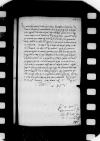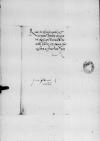Ex iis, quae scripserunt Gdańsk Town Council ⌊GedanensesGdańsk Town Council ⌋, facile apparet cubicularium ipsum litteras reddidisse, quoniam vero a Sigismund II Augustus Jagiellon (Zygmunt II August) (*1520 – †1572), 1529-1572 Grand Duke of Lithuania (ruled from 1544); 1530-1572 King of Poland (crowned vivente rege (ruled from 1548, after the death of his father); son of Sigismund I Jagiellon and Bona Sforza⌊rege iunioreSigismund II Augustus Jagiellon (Zygmunt II August) (*1520 – †1572), 1529-1572 Grand Duke of Lithuania (ruled from 1544); 1530-1572 King of Poland (crowned vivente rege (ruled from 1548, after the death of his father); son of Sigismund I Jagiellon and Bona Sforza⌋ missus erat et Vilnius (Wilno, Vilna), city in Lithuania, on the Vilnia river, capital of the Grand Duchy of Lithuania⌊VilnamVilnius (Wilno, Vilna), city in Lithuania, on the Vilnia river, capital of the Grand Duchy of Lithuania⌋ recta proficiscebatur, visum est illis, ut per oratores, quos mittunt ad Sigismund I Jagiellon (Zygmunt I) (*1467 – †1548), King of Poland and Grand Duke of Lithuania (1506-1548); Duke of Głogów (Glogau) (1499-1506), Duke of Opava (1501-1506), Governor of Silesia (1504-1506); son of King Kazimierz IV Jagiellon and Elisabeth of Austria⌊maiestatem regiamSigismund I Jagiellon (Zygmunt I) (*1467 – †1548), King of Poland and Grand Duke of Lithuania (1506-1548); Duke of Głogów (Glogau) (1499-1506), Duke of Opava (1501-1506), Governor of Silesia (1504-1506); son of King Kazimierz IV Jagiellon and Elisabeth of Austria⌋, de articulis istis informationem darent. Aliud ab eis nihil est responsum. Cum venerint oratores, rem ex eis cognoscemus.
De minis istis et denuntiationibus, de quibus scribit ad nos Reverendissima Dominatio Vestra, nihil est hic auditum. Nulla sunt comitia, in quibus non agatur de uniendis provinciis, inter alios articulos fuit nunc quoque ea de re unus, de quo cum sententiae dicerentur, praesens adfuit dominus Stanisław Kostka (*1487 – †1555), as a leader of the so-called nobles' party active in Royal Prussia since 1536, Kostka stood in opposition to most of the members of the Council of Royal Prussia, who wanted to maintain the autonomy of the province and a "balance of power" in terms of governance. The tension between the Prussian Subtreasurer and the Council had been increasing since the Diet in Graudenz (Grudziądz) in 1533. Kostka, connected with the royal court since his youth, was sent to Graudenz as the King's deputy and, contrary to custom, decided to take part in the proceedings. In response to such a step, the Council members stopped the meeting. Kostka accused them of hostility towards the Poles and intervened on this matter at the court. In the absence of the then Bishop of Ermland (Mauritius Ferber) it was Dantiscus who chaired the Graudenz Diet. The incident badly harmed his future relationships with Kostka; 1531-1555 Treasurer of the Prussian lands and Treasurer of Marienburg (Malbork); 1544-1545 Castellan of Elbing (Elbląg), 1545-1546 Castellan of Kulm (Chełmno); 1546-1549 Vice-Voivode of Kulm; 1546-1551 Voivode of Pomerania; 1551-1555 Voivode of Kulm (PSB 14, p. 356; Urzędnicy 5/2, p. 216; MAŁŁEK 1976, p. 119-123)⌊castellanus CulmensisStanisław Kostka (*1487 – †1555), as a leader of the so-called nobles' party active in Royal Prussia since 1536, Kostka stood in opposition to most of the members of the Council of Royal Prussia, who wanted to maintain the autonomy of the province and a "balance of power" in terms of governance. The tension between the Prussian Subtreasurer and the Council had been increasing since the Diet in Graudenz (Grudziądz) in 1533. Kostka, connected with the royal court since his youth, was sent to Graudenz as the King's deputy and, contrary to custom, decided to take part in the proceedings. In response to such a step, the Council members stopped the meeting. Kostka accused them of hostility towards the Poles and intervened on this matter at the court. In the absence of the then Bishop of Ermland (Mauritius Ferber) it was Dantiscus who chaired the Graudenz Diet. The incident badly harmed his future relationships with Kostka; 1531-1555 Treasurer of the Prussian lands and Treasurer of Marienburg (Malbork); 1544-1545 Castellan of Elbing (Elbląg), 1545-1546 Castellan of Kulm (Chełmno); 1546-1549 Vice-Voivode of Kulm; 1546-1551 Voivode of Pomerania; 1551-1555 Voivode of Kulm (PSB 14, p. 356; Urzędnicy 5/2, p. 216; MAŁŁEK 1976, p. 119-123)⌋. Ex eo quomodo res acta sit, quidve constitutum sit, cognoscere poterit. Ceterum bono sit animo Reverendissima Dominatio Vestra, qui terrores istos iaciunt, eos contemnat, nihil enim est eiusmodi futurum.
Johann von Höfen (Jan Hartowski, Ioannes Varschoviensis, Ioannes de Curiis) (†after 1547-09-01), probably a first cousin of Dantiscus, student of Valentinus Rawensis; in 1537 studied in Cracow; since 1545, upon Dantiscus' recommendation, in the service of Cracow bishop Samuel Maciejowski (SKOLIMOWSKA 2000)⌊AffinemJohann von Höfen (Jan Hartowski, Ioannes Varschoviensis, Ioannes de Curiis) (†after 1547-09-01), probably a first cousin of Dantiscus, student of Valentinus Rawensis; in 1537 studied in Cracow; since 1545, upon Dantiscus' recommendation, in the service of Cracow bishop Samuel Maciejowski (SKOLIMOWSKA 2000)⌋ Reverendissimae Dominationis Vestrae in gentilem meum accepi atque illi arma mea lubens concessi. Cupio enim Reverendissimae Dominationi Vestrae in omnibus gratificari. Cum Gertrud Lismanin (Lysmanova), townswoman from Thorn (Toruń); Kaspar Lysman's mother⌊LysemanowaGertrud Lismanin (Lysmanova), townswoman from Thorn (Toruń); Kaspar Lysman's mother⌋ quomodo rem agi velim, per dominum Stanisław Kostka (*1487 – †1555), as a leader of the so-called nobles' party active in Royal Prussia since 1536, Kostka stood in opposition to most of the members of the Council of Royal Prussia, who wanted to maintain the autonomy of the province and a "balance of power" in terms of governance. The tension between the Prussian Subtreasurer and the Council had been increasing since the Diet in Graudenz (Grudziądz) in 1533. Kostka, connected with the royal court since his youth, was sent to Graudenz as the King's deputy and, contrary to custom, decided to take part in the proceedings. In response to such a step, the Council members stopped the meeting. Kostka accused them of hostility towards the Poles and intervened on this matter at the court. In the absence of the then Bishop of Ermland (Mauritius Ferber) it was Dantiscus who chaired the Graudenz Diet. The incident badly harmed his future relationships with Kostka; 1531-1555 Treasurer of the Prussian lands and Treasurer of Marienburg (Malbork); 1544-1545 Castellan of Elbing (Elbląg), 1545-1546 Castellan of Kulm (Chełmno); 1546-1549 Vice-Voivode of Kulm; 1546-1551 Voivode of Pomerania; 1551-1555 Voivode of Kulm (PSB 14, p. 356; Urzędnicy 5/2, p. 216; MAŁŁEK 1976, p. 119-123)⌊castellanum CulmensemStanisław Kostka (*1487 – †1555), as a leader of the so-called nobles' party active in Royal Prussia since 1536, Kostka stood in opposition to most of the members of the Council of Royal Prussia, who wanted to maintain the autonomy of the province and a "balance of power" in terms of governance. The tension between the Prussian Subtreasurer and the Council had been increasing since the Diet in Graudenz (Grudziądz) in 1533. Kostka, connected with the royal court since his youth, was sent to Graudenz as the King's deputy and, contrary to custom, decided to take part in the proceedings. In response to such a step, the Council members stopped the meeting. Kostka accused them of hostility towards the Poles and intervened on this matter at the court. In the absence of the then Bishop of Ermland (Mauritius Ferber) it was Dantiscus who chaired the Graudenz Diet. The incident badly harmed his future relationships with Kostka; 1531-1555 Treasurer of the Prussian lands and Treasurer of Marienburg (Malbork); 1544-1545 Castellan of Elbing (Elbląg), 1545-1546 Castellan of Kulm (Chełmno); 1546-1549 Vice-Voivode of Kulm; 1546-1551 Voivode of Pomerania; 1551-1555 Voivode of Kulm (PSB 14, p. 356; Urzędnicy 5/2, p. 216; MAŁŁEK 1976, p. 119-123)⌋ significabo.
Opto Reverendissimam Dominationem Vestram bene valere. Cuius me fraterno amori commendo.


 BCz, 1599, p. 648
BCz, 1599, p. 648